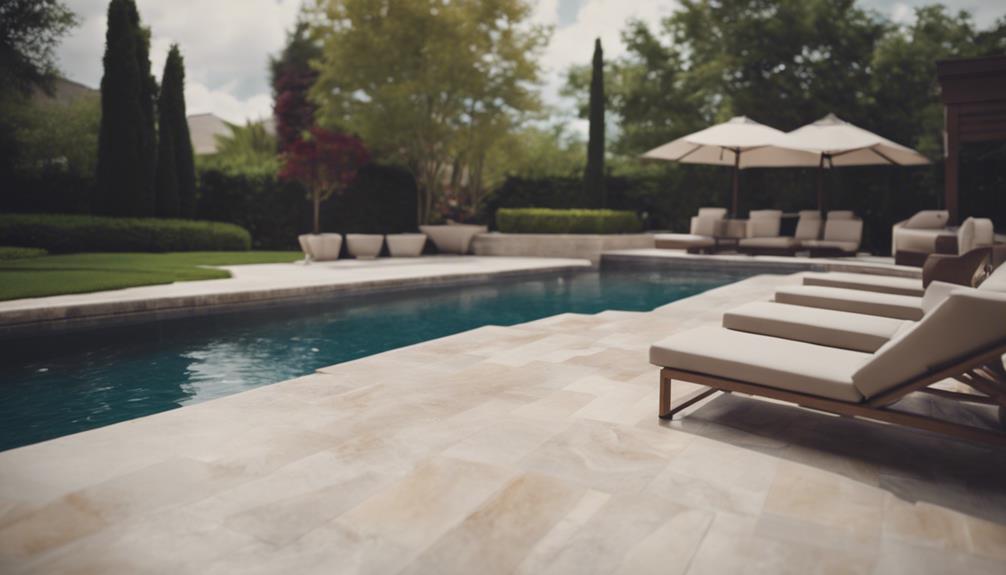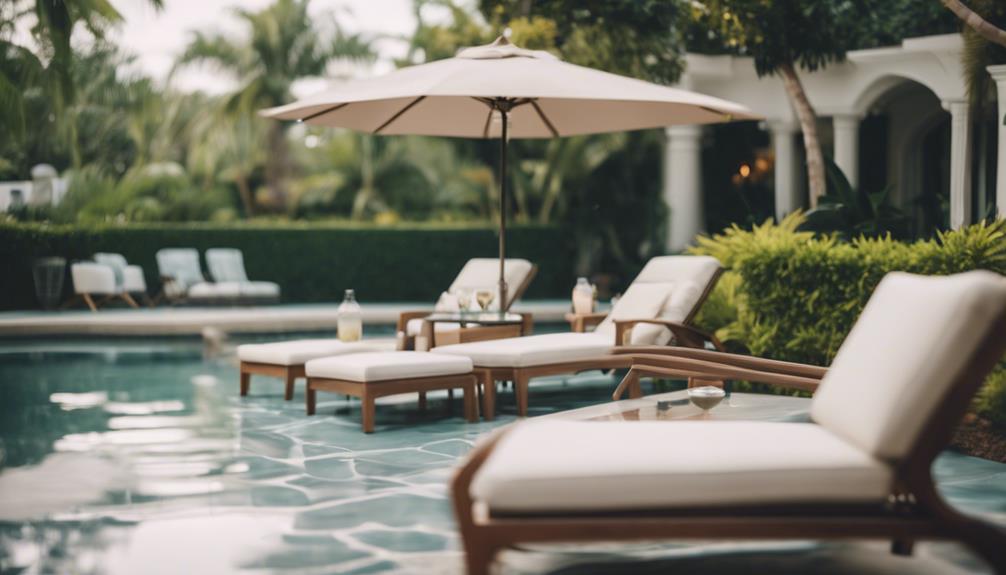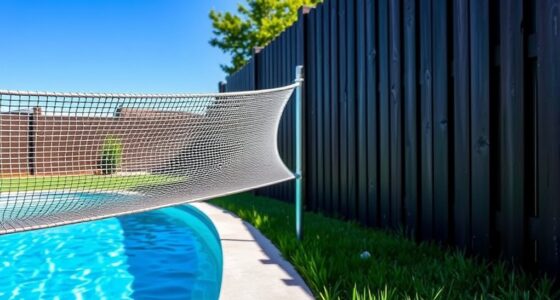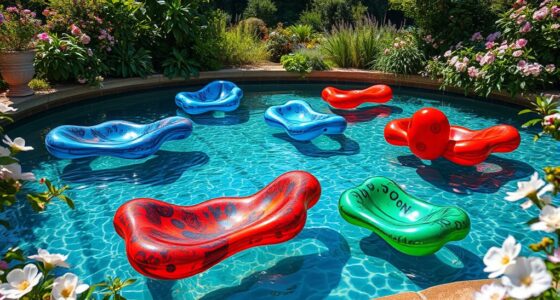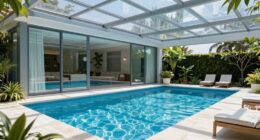For the best pool hardscape, consider materials like bluestone, flagstone, slate, and travertine for their durability and aesthetics. Concrete pavers offer versatility and low maintenance, while stamped concrete can mimic natural stone. Composite wood decking is aesthetically pleasing, durable, and requires minimal maintenance. Limestone hardscaping provides weather resistance and design versatility. Collaborating with a designer is essential for selecting the ideal material that aligns with your pool area needs. Remember to prioritize safety, durability, and aesthetics when planning your pool hardscape.
Key Takeaways
- Bluestone, flagstone, slate, travertine, and limestone are top choices for pool hardscapes.
- Consider durability, slip resistance, customization, and weather resistance when selecting materials.
- Collaborate with a designer for material selection that aligns with aesthetics and maintenance needs.
- Concrete pavers offer versatility, durability, and customizable design options for pool areas.
- Composite wood decking provides aesthetic appeal, durability, and low maintenance benefits for pool hardscapes.
Natural Stone Hardscapes
When considering materials for a pool hardscape, natural stone hardscapes stand out for their durability and timeless elegance.
Among the variety of natural stone options available, bluestone offers a non-slip and water-resistant surface that seamlessly blends with surrounding landscapes.
Flagstone, known for its warm earth tones, provides a durable and aesthetically pleasing choice.
Slate, another durable option, allows for customization and adds a unique touch to the pool area.
Travertine, prized for its beauty, heat resistance, and non-slip properties, offers a luxurious feel to the hardscape.
These natural stone materials not only enhance the visual appeal of the pool area but also ensure longevity and low maintenance, making them a popular choice for pool hardscapes.
Concrete Pavers and Stamped Patios
Exploring an alternative to natural stone hardscapes, concrete pavers and stamped patios offer versatile and durable options for designing a pool hardscape.
Concrete is a popular choice due to its versatility, durability, and low maintenance requirements. It can be textured, stamped, or treated to resemble natural stone, allowing for various design possibilities. Shapes and curves can be easily achieved with concrete, providing a customizable look for your pool area.
Additionally, stamped concrete, while offering aesthetic appeal, requires proper maintenance to prevent cracking over time.
Concrete is versatile, durable, and low maintenance.
Concrete can be textured, stamped, or treated to resemble natural stone.
Shapes and curves can be easily achieved with concrete.
Composite Wood Decking

The durability and aesthetic appeal of composite wood decking make it a desirable option for creating a pool hardscape. Composite wood decking offers a blend of natural beauty and easier maintenance, making it an attractive choice for pool surroundings. These decking materials often incorporate recycled components, making them eco-friendly options.
Resistant to water and stains, composite wood decking is more durable than traditional wood decking, which tends to split and rot over time. While composite decking may show signs of wear, it still maintains its structural integrity. Homeowners seeking a hardscape material that resembles natural wood but offers enhanced durability should consider composite wood decking for their pool area.
Limestone Hardscaping
Limestone hardscaping offers a versatile and durable option for creating a sophisticated pool surround that withstands various weather conditions and complements outdoor designs. Limestone is available in various colors and shapes, making it easy to work into any design due to its versatility. Its resistance to hard wear and weather changes enhances its appeal as a durable hardscape material.
Additionally, limestone holds up well to different weather conditions, ensuring longevity and minimal maintenance for pool areas. When considering limestone hardscaping for your pool surround, you can expect a timeless aesthetic that seamlessly blends with the natural surroundings while providing a sturdy foundation for your outdoor oasis.
- Versatile design options
- Durable material
- Weather-resistant properties
Planning Your Pool Hardscape
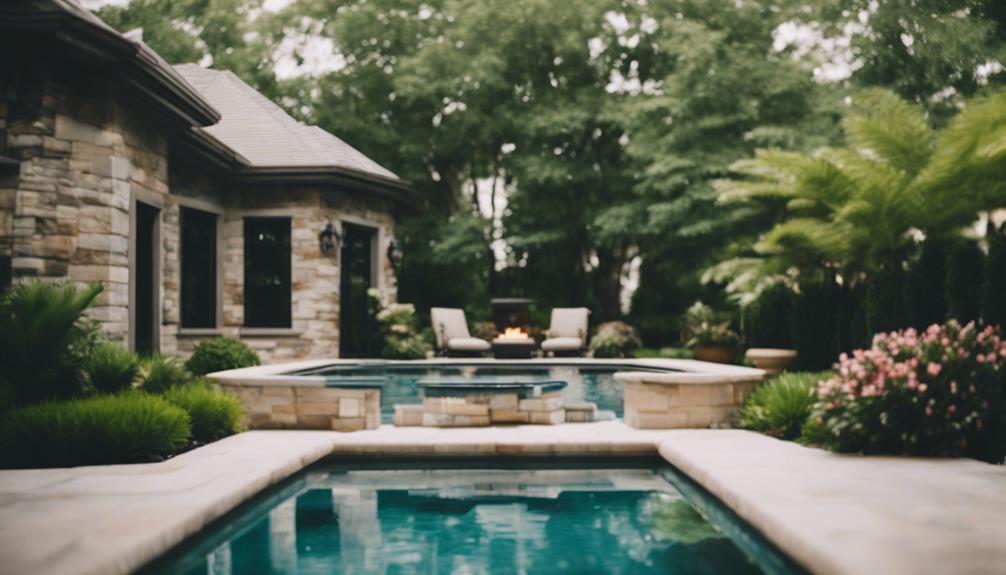
When designing your pool hardscape, it is important to carefully consider safety, durability, and aesthetic aspects to guarantee a functional and visually appealing outdoor space.
Collaborating with a designer can help determine the best material suited for your needs. Understanding the maintenance requirements of each material is vital in ensuring the longevity of your pool hardscape.
Select a material that not only complements your outdoor living area but also aligns with your desired aesthetic. Proper planning is essential for the design process, ensuring that the chosen hardscape material meets all your criteria.
Frequently Asked Questions
Can I Install Heating Elements Underneath Natural Stone Pool Patios?
Heating elements can be installed underneath natural stone pool patios to provide warmth and comfort. Proper installation is vital to guarantee safety and efficiency. Consult with a professional to determine the feasibility and best approach for your specific project.
Are There Any Eco-Friendly Options for Concrete Pavers?
In the world of concrete pavers, eco-friendly options bloom like a garden. Incorporate recycled materials into your design for a sustainable touch. Discuss with experts to blend green practices seamlessly into your outdoor oasis.
How Does Composite Wood Decking Fare in Extreme Weather Conditions?
Composite wood decking offers natural beauty and easier maintenance. It is resistant to water and stains but may show wear over time. In extreme weather conditions, composite decking performs well, maintaining durability and stability compared to traditional wood options.
Can Limestone Hardscaping Be Easily Customized for Unique Designs?
Limestone hardscaping is highly customizable for unique designs due to its versatility in colors and shapes. This material's adaptability allows for easy integration into various design schemes, ensuring a personalized and aesthetically pleasing pool hardscape.
What Factors Should I Consider When Choosing Lighting for My Pool Hardscape?
When selecting lighting for your pool hardscape, consider safety, ambiance, energy efficiency, and durability. Opt for fixtures that are weather-resistant, low voltage, and complement the design. Consult with a professional to guarantee proper placement and functionality.
Conclusion
To sum up, selecting the best materials for a pool hardscape involves careful consideration of factors like durability, maintenance, and aesthetics. According to a survey conducted by Pool & Spa News, 72% of homeowners prioritize durability when choosing hardscaping materials for their pools.
By collaborating with a designer and weighing the pros and cons of options like natural stone, concrete pavers, composite wood decking, and limestone, you can create a functional and visually appealing outdoor space that enhances your pool area.

